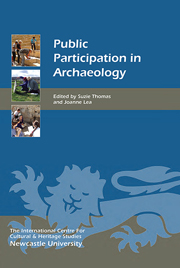Book contents
- Frontmatter
- Dedication
- Contents
- List of Illustrations
- Acknowledgments
- List of Abbreviations
- Preface
- Introduction
- Public Participation in Archaeology: International Models
- Public Participation in Archaeology Through Education
- 6 Accessing Archaeology in the School System: Powerful Partnerships — a Case Study of the Challenges and Rewards for Archaeologists, Teachers and Students (Canada)
- 7 Hook 'em When They're Young: Using Enquiry-Based Learning Workshops in Archaeology
- 8 Archaeology as Culturally Relevant Science Education: The Poplar Forest Slave Cabin
- 9 Heritage Education in Jordanian Schools: For Knowledge or Profit?
- Public Participation in Archaeology Through Tourism
- Public Participation in Archaeology Through Site Management and conservation
- List of Contributors
- Index
9 - Heritage Education in Jordanian Schools: For Knowledge or Profit?
from Public Participation in Archaeology Through Education
Published online by Cambridge University Press: 05 August 2014
- Frontmatter
- Dedication
- Contents
- List of Illustrations
- Acknowledgments
- List of Abbreviations
- Preface
- Introduction
- Public Participation in Archaeology: International Models
- Public Participation in Archaeology Through Education
- 6 Accessing Archaeology in the School System: Powerful Partnerships — a Case Study of the Challenges and Rewards for Archaeologists, Teachers and Students (Canada)
- 7 Hook 'em When They're Young: Using Enquiry-Based Learning Workshops in Archaeology
- 8 Archaeology as Culturally Relevant Science Education: The Poplar Forest Slave Cabin
- 9 Heritage Education in Jordanian Schools: For Knowledge or Profit?
- Public Participation in Archaeology Through Tourism
- Public Participation in Archaeology Through Site Management and conservation
- List of Contributors
- Index
Summary
Halfway through the interview, the author posed a question to the teacher: ‘So, do you think that our archaeological heritage is important?’ The teacher answered with confidence: ‘Of course!’, and went on to explain: ‘Our archaeological heritage is more expensive than oil … It has to be preserved, it brings hard currency through tourism into the country …’ (Teacher R 2005, pers comm).
The teacher's response was alarming. Questions were beginning to arise: why has she focused so much attention on the benefits of archaeology to tourism? Is there a link between what she taught and the curriculum aims and content? Is this an isolated case or is it a widespread phenomenon across the Jordanian education system? Is archaeology being used within this context to teach other aspects about the past and heritage? A research agenda was put in place in an attempt to find the answers to these questions. The outcome of this investigation is presented in this chapter.
Why Teach Archaeology?
The benefits of using archaeology to teach pupils about the past are varied and have long been researched. As early as the 19th century, Dewey (1899) argued for the teaching of ‘prehistory’ to children in particular, as the nature of prehistory relates to children's interests and environment. His support for the use of archaeology in teaching young pupils fits with his philosophy of education which called for evidence-based curriculum and encouraged experimentation, observation and analysis, rather than the memorisation of facts (Dewey 1884). Dewey's views are still shared by many archaeologists, who argue that this approach to teaching pupils about archaeology would enhance their skills and understanding of the past (see for example Stone 2004; Antoni et al 2004; Hogberg 2007).
- Type
- Chapter
- Information
- Public Participation in Archaeology , pp. 105 - 116Publisher: Boydell & BrewerPrint publication year: 2014



